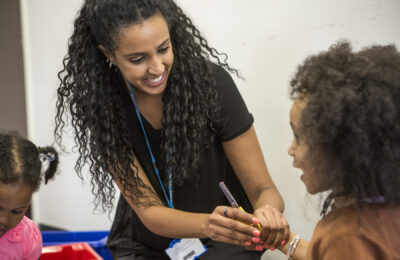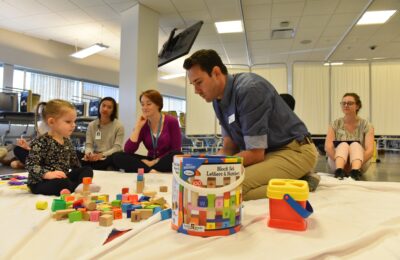
Emotional care of babies, children, young people and families (EC1)
Develop your confidence and expertise in communicating with children and their families
This two-year course will introduce you to key psychoanalytic ideas and how they connect to your real-life observations and experience of working with children of all ages and their families. Experiential learning, an observational approach, and the application of psychoanalytic ideas to the issue of difference and diversity are integral to this course.
Please note: you may see the EC1 course also referred to as PAGDTP001 in communications from our application system.
This course is now only accepting applications from students who do not require a visa to attend.
About this course
In each year you will study three modules lasting up to ten weeks each.
Year one
In order to gain the graduate certificate you will need to complete the following three modules:
- ‘Understanding children’s communication and its meaning’
- ‘Seeing beneath the surface: developing observational skills’
- ‘Family crises and their consequences’
Year two
To gain the graduate diploma you will first need to pass the graduate certificate and then complete the following three modules:
- ‘Growing up: the main conflicts and challenges’
- ‘Disturbing and challenging behaviour: issues for looked-after children’
- ‘Growing up with disability’
Teaching will be delivered at the Tavistock Centre via weekly lectures and reading seminars.
Lectures
Weekly lectures will take place on Thursdays from 5pm to 6pm. The aim of the lectures is to introduce you to core psychoanalytic concepts and how they can be understood throughout different life stages in ordinary as well as complex situations. Particular care and attention will be given to thinking about the influence of early life experiences and the way they influence how we negotiate the challenges of later development.
Reading seminars
You will participate in a small reading group with a seminar leader on Thursdays from 6:15pm to 7:30pm. You will need to undertake some reading prior to each seminar. The aim of this group is to have a space to reflect and deepen understanding and link some of the topics presented in the lectures to the reading and real-life experiences.
The seminar structure will change depending on the module undertaken. During some of the modules, there will be the opportunity to present your own work and/or ideas as well as listen to other students’ presentations.
Young child observation seminars
During the Summer term of year one, you will undertake the module ‘Seeing beneath the surface: developing observational skills’. Lectures will be replaced by a small observation seminar group, where you will present your observation of a nursery-aged child. The Tavistock Model of Observation will be used and you will be supported to arrange a five to six week observation of a young child in a nursery, family centre or school setting. Please note that it is your responsibility to arrange the observation, but you will be given guidance and support with this task.
Following each observation, you will make detailed notes of what you have observed and you will have the opportunity to bring your observation notes to discuss in your small seminar group. With the help of the group and seminar facilitator, you will think about and observe some of the communications that may be happening beneath what is immediately observable.
Modules
Module 1: Understanding Children’s Communication and its Meaning
- Year of Study: Year One
- FHEQ Level: Level 6
- Credit Weighting: 20 credits
- Module Status: Core
- Module Leader: Korina Soldatic
Module Aims
- To develop a systematic understanding of the way relationships in family life, especially in the early years, can influence ways of communicating in later life at a conscious and unconscious level.
- To gain knowledge of how key psychoanalytic ideas can be useful in understanding the meaning, complexity and ambiguity of communication within relationships.
- To consider the impact of issues related to diversity and difference on relationships.
- To develop the ability to describe, critically evaluate, make links with your own experience and comment on a range of papers, articles and books relevant to communication.
Module Assessment
Students are required to submit a 3000-word essay.
Module 2: Family Crises and their Consequences
- Year of Study: Year One
- FHEQ Level: Level 6
- Credit Weighting: 20 credits
- Module Status: Compulsory
- Module Leader: Felicity Tyson
Module Aims
- To learn about a range of crisis events that can occur within families, their impact on family life and the variety of different emotional responses by family members.
- To explore cultural and other factors that are relevant and how they might influence what happens in a crisis.
- To gain understanding of the factors what might help or hinder recovery from unexpected adverse events.
- To apply some key ideas from psychoanalytic thinking to understand responses to crises.
Module Assessment
Students are required to produce a 4,000-word project work book.
Module 3: Seeing Beneath the Surface: Developing Observational Skills
- Year of Study: Year One
- FHEQ Level: Level 6
- Credit Weighting: 20 credits
- Module Status: Compulsory
- Module Leader: Korina Soldatic
Module Aims
To gain knowledge of the method of observation that was developed at the Tavistock Centre and which is based on psychoanalytic understanding and to apply this knowledge to child development.
To initiate an observational project by observing a young child, to make detailed notes of the observation for seminar group discussion and to identify some of the difficulties of ‘seeing beneath the surface.’
To develop an understanding and awareness of non-verbal communication, the struggle to stay in touch with what is observed, and to notice the impact on yourself when observing children.
To think about the importance of cultural aspects of observation.
Module Assessment
Students are required to submit a 4,000-word observation paper.
Module 4: Growing Up: The Main Conflicts and Challenges
- Year of Study: Year Two
- FHEQ Level: Level 6
- Credit Weighting: 20 credits
- Module Status: Core
- Module Leader: Elizabeth Power and Sheila Miller
Module Aims
- To learn about emotional development at different stages of life from birth to old age.
- To learn about the main emotional conflicts and challenges which contribute to emotional development at different phases of life.
- To develop the ability to apply some key ideas from psychoanalytic thinking, and particularly the significance of early experience, to increase understanding of emotional development.
- To participate in independent learning to read and critically evaluate literature that exemplifies some of the emotional issues encountered in the process of growing up.
Module Assessment
Students are required to submit a 3,000-word review.
Module 5: Disturbing and Challenging Behaviour: Issues for Looked after Children
- Year of Study: Year Two
- FHEQ Level: Level 6
- Credit Weighting: 20 credits
- Module Status: Compulsory for Graduate Diploma
Module Aims
- To increase students’ understanding of care-experienced children and young people, who have experienced abuse and neglect and who present challenging and disturbing behaviour.
- To learn about key psychoanalytic ideas that can help with thinking about the impact of abuse and neglect on development and about the connections between behaviour and development.
- To develop an understanding of some key issues for care-experienced children and young people and their families.
- To help students to notice and reflect upon their own thoughts and feelings about their observations and experiences, as information to help with making sense of what is happening in complex and ambiguous situations.
- To help students prepare and deliver a presentation of a case study using appropriate technology and digital resources.
Module Assessment
Students are required to submit a 3,000-word case study report.
Module 6: Growing Up with Disability
- Year of Study: Year Two
- FHEQ Level: Level 6
- Credit Weighting: 20 credits
- Module Status: Compulsory
Module Aims
- To learn about a wide range of biological, genetic, physical and psychological factors that can impact on a child’s functioning and can lead to difficulties and disabilities.
- To explore a range of specific disabilities and the emotional impact of disabilities on the child, on their families and on those working with people with disabilities.
- To understand how issues to do with difference and disability, and the wider society’s views of disability can impact on a child growing up with disabilities and their family.
- To explore how psychoanalytic ideas can help understanding of the emotional impact of disabilities.
Module Assessment
- Students are required to submit a 3,000-word reflective account.
Who is this course for?
This course is suitable for those at the early stages of developing a professional career in the children’s and young people’s sector, as well as those working in the field who wish to further develop their knowledge and understanding and acquire a formal university accredited qualification.
You may:
- work in a support role in the health, education, social care, residential care or childcare sector
- have limited work-based experience and want to develop your career in working with children and families
- be looking for a career change and a starting point in a new working role with children and young people
Past students have been:
- au pairs and child minders
- journalists
- professionals from the business sector
- community workers
- family support workers
- foster carers
- nursery workers and play leaders
- social work assistants
- teaching assistants
- staff in children’s centres
If you have successfully completed our ten-week Developing a diverse child and adolescent workforce: an introductory course (CPD64) then this course may also be for you.
Course details
In order to undertake this course, we ask that you:
- have an interest in work with children of all ages, young people and their families
- have a willingness to engage with the emotional complexities of identity, difference and diversity and their impact upon emotional development
- have achieved an undergraduate degree or demonstrate equivalent learning or achievement (please note an undergraduate degree is not essential)
- have the capacity for active participation in workshops and seminar
- be motivated for independent reading and study.
We also ask that you submit a personal statement of between 700 – 1000 words as part of your application form. In this statement, you should outline your suitability for, and interest in, the course, and detail any relevant previous experience or study. If you have any queries about this, please contact us.
Home
£4,050 per year (2025/26)
International
£8,100 per year (2025/26)
You will be charged course fees for each year of your course. If your course is longer than one year, the fees that you will be charged after the first year will be subject to an annual uplift, which is not normally expected to exceed 6% or the Consumer Price Index (as stated on 01 September of that academic year) if higher than 6%. At its discretion and in rare instances, the Trust may determine a figure greater than either, to reflect costs associated with the activity (e.g. assessment, teaching, administration etc.), which shall not exceed 10%. Please refer to our Terms and Conditions, and Student Fees & Refund Policy for further information.
Financial support may be available to help you fund your studies at the Tavistock and Portman NHS Foundation Trust.
Assessment
You will be assessed at the end of each module through a range of different written assignments.
Attendance
Thursdays from 5pm to 7.30pm (except for module three in year one, when the teaching will be from 5pm to 7.45pm).
Please note that you will also need to set aside an additional 2-3 hours per week for observation of a young child and writing up your notes for a period of 5-6 weeks during the Summer term in the first year. It is your responsibility to arrange this observation, but you will be given guidance and support with this task.
This course will develop your confidence in working within early years settings and allow you to apply the knowledge and practical experience you gain to your work or volunteering setting.
Many graduates use this course to help them gain entry to our Working with children, young people and families: a psychoanalytic observational approach (M7, daytime) course.
In order to undertake this course, we ask that you:
- have an interest in work with children of all ages, young people and their families
- have a willingness to engage with the emotional complexities of identity, difference and diversity and their impact upon emotional development
- have achieved an undergraduate degree or demonstrate equivalent learning or achievement (please note an undergraduate degree is not essential)
- have the capacity for active participation in workshops and seminar
- be motivated for independent reading and study
- submit a personal statement of between 700-1000 words in your application form
Application support and deadlines
Interested in this course but have questions before applying? Book a 1-1 session with an admissions advisor to find out more.
There are a number of important application deadlines associated with our postgraduate courses, however we encourage you to apply as early as possible, as spaces on our courses are limited and can be competitive.
Applications for this course are expected to close on the following dates:
- Monday 30 June 2025: International applicant student visa deadline
- Monday 31 July 2025: Summer application deadline
Why study with us?
This course will help you acquire skills, understanding and reflective practice in working with babies, children, young people, parents and families. You will develop your knowledge and understanding of the complexity of communication within relationships.
You will be introduced to key ideas and concepts from psychoanalytic research focussing upon the emotional development of children within their families and society at large.
By the end of the course you will be able to use psychoanalytic ideas and concepts to help you think about and address the emotional complexities of difference and diversity, and the impact they have upon the development of the individual and wider society.
You will also be able to develop your confidence and expertise in a way which enables you to progress in your career working with children and families.
Testimonials
Course facilitators
Validations
This course is validated by the University of Essex.
Apply now
Start your application for this course.
Recommended courses
Explore courses to study beforehand
-
 CPD certificate
CPD certificate 
Developing a diverse child and adolescent workforce (CPD64)
Explore courses to study next
-
 Master’s Eligible for Student Visa
Master’s Eligible for Student Visa
Perinatal, child, adolescent and family work: a psychoanalytic observational approach (M7, daytime)

